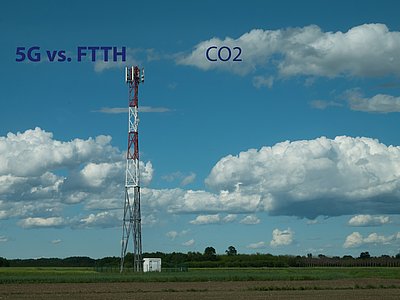This study analyses and quantifies the energy consumption and CO₂ emissions associated with operating modern telecommunications access networks, both fixed broadband (FFTH) and mobile networks (4G/5G). To quantify the environmental impacts, specific bottom-up models for the fixed and mobile access network are developed and used to endogenously determine the asset-related quantities of active network elements and their respective energy consumption. The modelling task is carried out for Germany based on household and population data at municipality level from the German Federal Institute for Research on Building and Regional Planning (BBSR), energy consumption data from the EU Code of Conduct on Energy Consumption of Broadband Communication Equipment and the CO₂ emission factor for the electricity mix from the German Federal Environment Agency, in order to capture the demand for VHCN fixed and mobile access services.
Furthermore, the study investigates how different settlement structures shape the environmental footprint of telecommunications networks. Based on these findings, it is analysed whether the use of mobile networks represents a sustainable strategy for the supply of rural areas in comparison to fixed network technologies. From an environmental perspective, mobile networks, especially 5G, are considered as a possible substitute for the provision of broadband access in rural areas. The analysis shows that, from an environmental perspective, FTTH access networks perform better than mobile access networks. These findings hold for any regional structure but are even more significant for rural areas.
The analysis focuses on energy consumption and CO2 emissions of network operations. Deployment-related emissions and spill-over effects induced by using ICT for eco-benefits in other sectors are beyond the scope of this analysis.
 ©
Photo Credit:
Embreuš Marko - stock.adobe.com
©
Photo Credit:
Embreuš Marko - stock.adobe.com
WIK Working Paper No. 10: Sustainability of fixed and mobile networks compared across different regional structures
Can modern mobile access networks substitute FTTH access? The study investigates this question by applying two bottom-up access network models for different German regio-types and usage intensities. From a sustainability perspective FTTH access networks perfom better than mobile networks and especially better in rural areas.


![[Translate to English:] Dr Gabriele Kulenkampff](/fileadmin/_processed_/3/3/csm_Gabi-Kulenkampff_195c6a15d3.jpg)